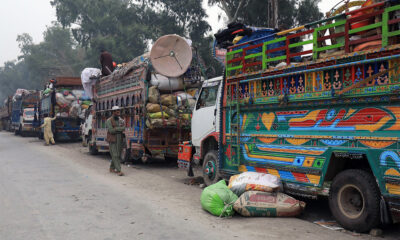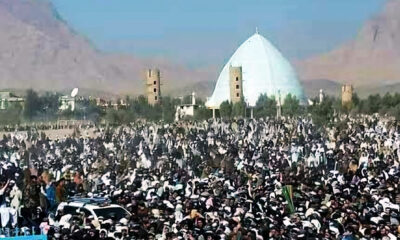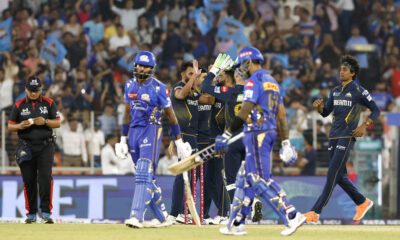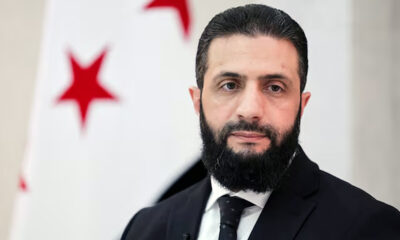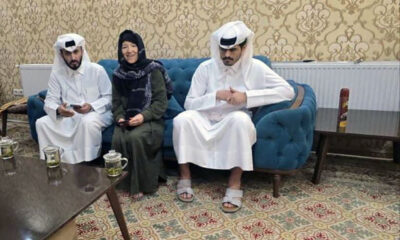World
Israeli troops raid, order closure of Al Jazeera’s West Bank bureau
The network added that it would take legal action to protect it rights and promised to continue its coverage, read the report.
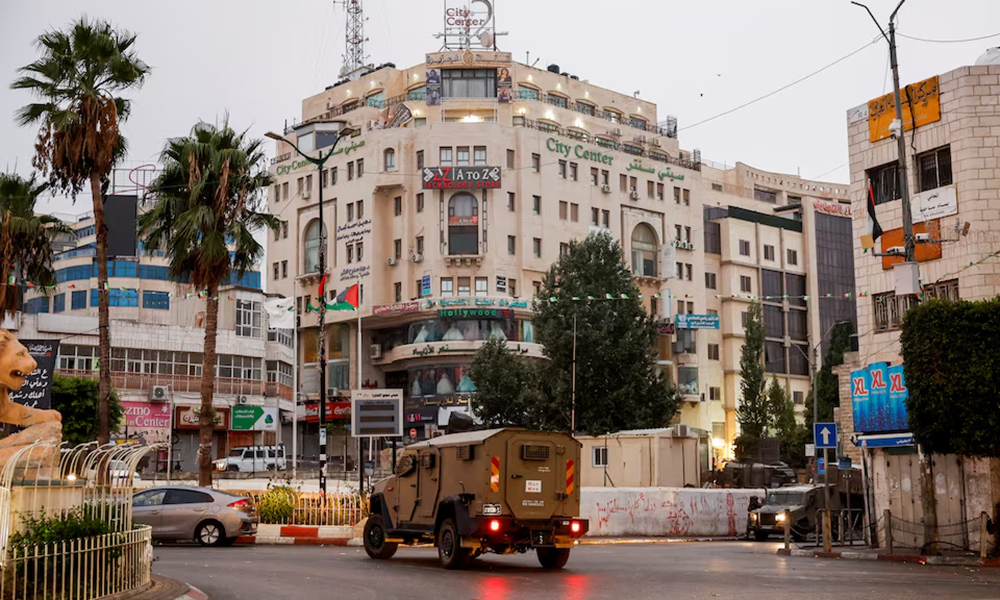
Israeli forces raided the bureau of media network Al Jazeera in the West Bank city of Ramallah early on Sunday morning, issuing it with a military order to shut down operations, the network and the Israeli military said on Sunday.
The Qatar-headquartered channel aired live footage of Israeli troops entering the office with their weapons drawn and handing a military court order to Ramallah bureau chief Walid al-Omari forcing the bureau to close for 45 days, Reuters reported.
The Israeli military said, in response to a Reuters query, that the channel’s offices had been sealed and its equipment confiscated.
The military added that the order was signed after an intelligence assessment determined that the offices were being used “to incite terror, to support terrorist activities.”
“The channel’s broadcasts endanger the security and public order in both the area and the State of Israel as a whole,” the statement said.
Al Jazeera called the raid “a criminal act” and held the government of Israeli Prime Minister Benjamin Netanyahu responsible for the safety of its journalists, it said in a statement.
The network added that it would take legal action to protect it rights and promised to continue its coverage, read the report.
“Al Jazeera rejects the draconian actions, and the unfounded allegations presented by Israeli authorities to justify these illegal raids,” it said.
Al-Omari said the order he received accused Al Jazeera of “incitement to and support of terrorism” and he said the soldiers confiscated the bureau’s cameras before leaving, Al Jazeera reported.
Israeli communications minister Shlomo Karhi confirmed the closure in a statement that called Al Jazeera “the mouthpiece” of Gaza’s Hamas and Lebanon’s Iran-backed Hezbollah. “We will continue to fight in the enemy channels and ensure the safety of our heroic fighters” he said.
The Palestinian Journalists’ Syndicate condemned Israel’s move, saying “this arbitrary military decision is considered a new violation against journalistic and media works, which has been exposing the occupation’s crimes against the Palestinian people.”
The Israeli government in May banned Al Jazeera from operating inside Israel, in a move authorised by an Israeli court, and raided a Jerusalem hotel the network used as its office, saying its broadcasts threatened national security, Reuters reported.
The network, which says it has no affiliation with militant groups, has provided on-the-ground coverage of Israel’s nearly year-long military offensive in Gaza and of a parallel surge in violence in the West Bank.
Unrest has mounted there since the start of the Gaza war, with regular sweeps by Israeli forces that have involved thousands of arrests, regular gun battles between security forces and Palestinian fighters, Palestinian street attacks and attacks by Jewish settlers on Palestinian communities.
Al Jazeera, which is funded in part by the Qatari government, has previously rejected accusations that it harmed Israel’s security as a “dangerous and ridiculous lie” that puts its journalists at risk.
It has accused Israeli authorities of deliberately targeting and killing several of its journalists, including Samer Abu Daqqa and Hamza AlDahdooh, both killed in Gaza during the conflict. Israel has said it does not target journalists.
Qatar established Al Jazeera in 1996 and views the network as a way to bolster its global profile, read the report.
Qatar, along with Egypt and the United States has mediated ceasefire negotiations under which Israel recovered some of those taken hostage on Oct. 7 in a Hamas-led attack on Israel.
The internationally-recognised Palestinian Authority exercises limited self-rule in the West Bank under Israeli occupation.
World
Myanmar quake death toll nears 700 as international aid starts to arrive

International aid began to arrive in Myanmar on Saturday as rescuers searched for survivors after a powerful earthquake devastated the Southeast Asian nation amid concerns the number killed would soar.
The death toll in Myanmar jumped to 694 with 1,670 injured, the military government said, up sharply from the 144 dead that state media reported on Friday, according to Reuters.
“Infrastructure such as roads, bridges, and buildings were affected, leading to casualties and injuries among civilians. Search and rescue operations are currently being carried out in the affected areas,” the junta said in a statement issued on state media.
The junta leader, General Min Aung Hlaing, had warned on Friday of more deaths and injuries as he invited “any country” to provide help and donations.
A Chinese rescue team arrived on Saturday while Russia and the U.S. offered aid in the disaster, which struck at lunchtime on Friday and damaged hundreds of buildings in neighbouring Thailand.
The United States Geological Service’s predictive modelling estimated the death toll could exceed 10,000 people in Myanmar, and that losses could be greater than the value of the country’s gross domestic product. Susan Hough, a scientist in the USGS’s Earthquake Hazards Program, told Reuters it was difficult to predict an earthquake’s death toll, for various reasons including timing. When an earthquake strikes during the daytime, as it did in Myanmar, “people are awake, they have their wits about them, they are better able to respond,” she said.
SEARCHING FOR WORKERS IN TOWER RUBBLE
Much of the devastation was in Myanmar’s second-largest city, Mandalay, close to the epicentre of the quake.
In the Thai capital Bangkok, 1,000 km (620 miles) from the epicentre a rescue mission was stepped up on Saturday to find construction workers trapped under the rubble of a collapsed 33-storey tower.
A 37-strong team from China landed in Yangon, Myanmar’s former capital, early on Saturday, carrying medicine and equipment to detect signs of life with them, the Chinese embassy said in a Facebook post.
Russia said it was sending 120 experienced rescuers as well as doctors and search dogs, state news agency TASS reported.
U.S. President Donald Trump said on Friday he had spoken with officials in Myanmar and that his administration would be providing some form of assistance.
Hough, who worked in Myanmar on the local seismology network, said the country’s mix of modern structures and traditional buildings would also play a role. Traditional buildings “are going to be less potentially deadly than concrete,” she said.
Thai authorities said nine people had died and 101 were missing in Bangkok, mostly labourers trapped in the rubble of the collapsed tower.
“We will do everything, we will not give up on saving lives, we will use all resources,” Bangkok Governor Chadchart Sittipunt said at the site on Saturday, as excavators moved debris and drones scoured the rubble searching for survivors.
The Thai capital ground to a halt on Friday and Chadchart said hundreds of people had spent the night in city parks, but he said the situation was improving.
World
Putin suggests temporary administration for Ukraine to end war
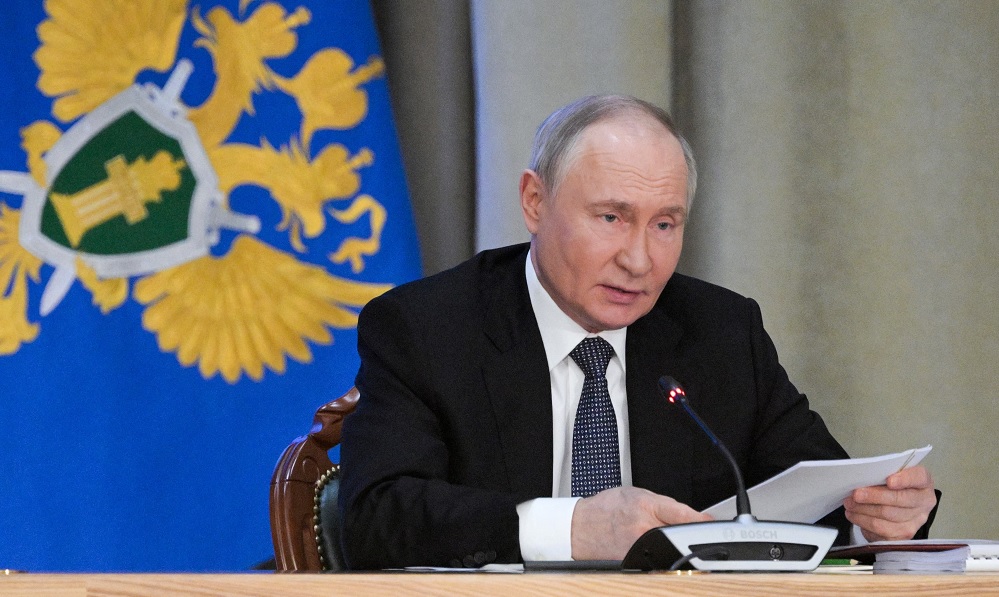
Russian President Vladimir Putin suggested Ukraine be placed under a form of temporary administration to allow for new elections and the signature of key accords to reach a settlement in the war, Russian news agencies reported early on Friday.
Putin’s comments, during a visit to the northern port of Murmansk, come amid U.S. attempts to forge a settlement to the conflict by re-establishing links with Russia and engaging with both Moscow and Kyiv, in separate talks. The Kremlin leader said he believed U.S. President Donald Trump truly wanted peace, Reuters reported.
Russia’s invasion of Ukraine in February 2022 has left hundreds of thousands of dead and injured, displaced millions of people, reduced towns to rubble and triggered the sharpest confrontation for decades between Moscow and the West.
Putin’s suggestion of a temporary administration appeared to address his long-held complaint that Ukraine’s authorities are not a legitimate negotiating partner as President Volodymyr Zelenskiy has stayed in power beyond the May 2024 end of his mandate.
“In principle, of course, a temporary administration could be introduced in Ukraine under the auspices of the U.N, the United States, European countries and our partners,” Putin was quoted as saying in talks with seamen at the port.
“This would be in order to hold democratic elections and bring to power a capable government enjoying the trust of the people and then to start talks with them about a peace treaty.”
He said Trump’s efforts to proceed with direct talks with Russia – in contrast with his predecessor Joe Biden, who shunned contacts – showed the new president wanted peace.
“In my opinion, the newly elected president of the United States sincerely wants an end to the conflict for a number of reasons,” the agencies quoted him as saying.
A White House National Security Council spokesperson, asked about Putin’s remarks on temporary administration, said governance in Ukraine was determined by its constitution and the people of the country.
There was no immediate comment from Ukraine.
European leaders have pressed on with their own efforts, pledging after a meeting in Paris on Thursday to strengthen Kyiv’s army to ensure it was the cornerstone of future security in Ukraine.
France and Britain tried to expand support for a foreign “reassurance force” in the event of a truce with Russia, although Moscow rejects any presence of foreign troops in Ukraine.
UKRAINE REJECTS NOTION OF ILLEGITIMACY
Zelenskiy has rejected any notion questioning his legitimacy, saying Ukraine is barred by law from holding elections under martial law and holding a poll in wartime conditions would in any case prove impossible.
Zelenskiy has repeatedly accused Putin in recent days of wanting to press on with the conflict.
The Trump administration has proposed a new, more expansive minerals deal with Ukraine, according to three people familiar with the ongoing negotiations and a summary of a draft proposal obtained by Reuters.
Trump has said a minerals deal will help secure a peace agreement by giving the United States a financial stake in Ukraine’s future.
In his comments, Putin said Russia was steadily moving forward to achieving the goals it had set out in its Ukraine operation.
Russia, Putin said, was in favour of “peaceful solutions to any conflict, including this one, through peaceful means, but not at our expense”.
“Throughout the entire line of military contact, our troops are holding the strategic initiative,” he said.
“We are gradually – perhaps not as quickly as some might like – but still persistently and with confidence moving towards achieving the goals set out at the beginning of this operation,” the agencies quoted him as saying.
More than three years after launching their full-scale invasion of Ukraine, Russian forces now hold about 20% of the country, with Moscow declaring four regions annexed. Its forces have also recovered much of the territory it initially lost in a Ukrainian incursion last August into its western Kursk region.
Putin praised the efforts in seeking a solution from the BRICS grouping it promotes as an alternative to traditional alliances – singling out China and India for praise.
He said Russia was ready to cooperate with many countries, including North Korea, to help end the war.
Western and Ukrainian sources say more than 11,000 North Korean troops have been sent to bolster Russian forces in the Kursk region, although Moscow has not confirmed this.
Putin said Russia was also ready to work with Europe, but adding that Europe “conducts itself in inconsistent fashion”.
European countries, he said, were trying “lead us around by the nose, but it’s okay, we’ve become used to it. I hope that we won’t make any mistakes based on excessive trust in our so-called partners.”
World
Secretive Chinese network tries to lure fired US federal workers, research shows
Researcher identifies “network of fake consulting and headhunting firms”

A network of companies operated by a secretive Chinese tech firm has been trying to recruit recently laid-off U.S. government workers, according to job ads and a researcher who uncovered the campaign, Reuters reported Wednesday.
Max Lesser, a senior analyst on emerging threats with the Washington-based think tank Foundation for Defense of Democracies, said some companies placing recruitment ads were “part of a broader network of fake consulting and headhunting firms targeting former government employees and AI researchers.”
Little information is publicly available on the four consultancies and recruitment companies allegedly involved in the network, which in some cases shared overlapping websites, were hosted on the same server, or had other digital links, according to Reuters’ reporting and Lesser’s research.
The four companies’ websites are hosted at the same IP address alongside Smiao Intelligence, an internet services company whose website became unavailable during Reuters’ reporting.
Reuters could not determine the nature of the relationship between Smiao Intelligence and the four companies.
The news agency’s attempts to track down the four companies and Smiao Intelligence ran into numerous dead-ends including unanswered phone calls, phone numbers that no longer work, fake addresses, addresses that lead to empty fields, unanswered emails and deleted job listings from LinkedIn.
Lesser, who uncovered the network and shared his research with Reuters ahead of publication, said the campaign follows “well-established” techniques used by previous Chinese intelligence operations.
“What makes this activity significant,” he said, “is that the network seeks to exploit the financial vulnerabilities of former federal workers affected by recent mass layoffs.”
Reuters could not determine if the companies are linked to the Chinese government or whether any former federal workers were recruited.
Asked about the research, three intelligence analysts told Reuters the network appeared to be a prime example of how foreign-linked entities are trying to gather intelligence from staff fired or forced into retirement by President Donald Trump and billionaire tech tycoon Elon Musk’s Department of Government Efficiency.
A spokesperson for the Chinese Embassy in Washington told Reuters in an email that China was unaware of any of the entities allegedly involved in the campaign and Beijing respects data privacy and security.
A White House spokesperson said China was constantly trying to exploit the United States’ “free and open system” through espionage and coercion.
“Both active and former government employees must recognize the danger these governments pose and the importance of safeguarding government information,” the spokesperson said.
One of the companies in the network, RiverMerge Strategies, bills itself on its website as a “professional geopolitical risk consulting company” and posted two since-deleted job listings on its since-removed LinkedIn page in mid-February.
One ad that sought a “Geopolitical Consulting Advisor” with experience with government agencies, international organizations, or multinational corporations, displayed that it had more than 200 applications, according to a screenshot of the LinkedIn post.
The other sought a human resources specialist who could “utilize a deep understanding of the Washington talent pool to identify candidates with policy or consulting experience,” and “leverage connections to local professional networks, think tanks, and academic institutions.”
-

 Sport5 days ago
Sport5 days agoAfghanistan eliminated from Asian Beach Soccer Championship
-

 World4 days ago
World4 days agoSecretive Chinese network tries to lure fired US federal workers, research shows
-
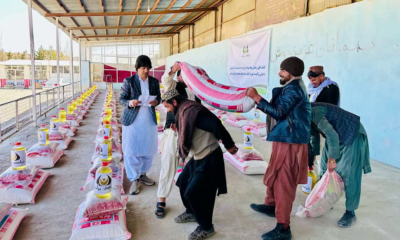
 Latest News5 days ago
Latest News5 days agoDozens of needy families in Ghazni get much needed food aid from Bayat Foundation
-

 Latest News4 days ago
Latest News4 days agoAfghanistan has the right to access Amu River’s water: Uzbek minister
-

 Sport5 days ago
Sport5 days agoAFC Asian Cup 2027 Qualifiers: Myanmar defeat Afghanistan 2-1
-

 Latest News3 days ago
Latest News3 days agoAmnesty international urges Pakistan to halt Afghan deportations
-

 Climate Change4 days ago
Climate Change4 days agoUN and ICRC warn of serious water shortage in Afghanistan
-

 Latest News3 days ago
Latest News3 days agoAfghanistan-Iran-Europe railway corridor activated


